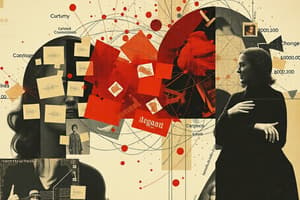Podcast
Questions and Answers
Which of the following best describes correlation?
Which of the following best describes correlation?
- The ability to find and evaluate information.
- A strong causal relationship between two variables.
- A method of socialization.
- A relationship where a change in one variable coincides with a change in another. (correct)
Causation implies that one variable causes changes in another.
Causation implies that one variable causes changes in another.
True (A)
What are three major agents of socialization?
What are three major agents of socialization?
Family, School/peers, Media
The term '______' refers to the ability to find, evaluate, organize, and communicate information.
The term '______' refers to the ability to find, evaluate, organize, and communicate information.
Match the following socialization concepts with their definitions:
Match the following socialization concepts with their definitions:
Which of the following is considered a credible source?
Which of the following is considered a credible source?
Nature refers to environmental influences on behavior and personality.
Nature refers to environmental influences on behavior and personality.
Who developed the concepts of 'I' and 'ME' in socialization?
Who developed the concepts of 'I' and 'ME' in socialization?
The term 'per capita' means _____ person.
The term 'per capita' means _____ person.
What is the primary focus of socialization?
What is the primary focus of socialization?
Flashcards are hidden until you start studying
Study Notes
Correlation vs. Causation
- Correlation: A relationship where a change in one variable coincides with a change in another (e.g., smoking and increased movie attendance).
- Causation: Indicates one variable directly affects another (e.g., smoking causing lung cancer).
Per Capita Definition
- "Per capita" translates to "per person"; useful in analyzing statistics, such as crime rates.
- Example: 1,000 murders in a population of 100,000 results in a rate of 10 murders per 1,000 people.
Information Literacy
- Capability to find, evaluate, organize, use, and communicate information across diverse formats.
- Critical in decision-making and problem-solving situations.
- Involves identifying credible sources, such as peer-reviewed journals and government data.
- Credible resources include .gov, .edu, .org websites, reputable documentaries, and verified speeches/photos.
Socialization
- Process of learning to participate in social life and perpetuating cultural norms.
- Influenced by three major agents:
- Family
- School/Peers
- Media
Nature vs. Nurture Debate
- Nature: Refers to genetic and environmental influences.
- Nurture: Encompasses upbringing and personal experiences.
Socialization Process Components
- Self-Concept: Personal feelings and perceptions about oneself.
- Social Identity: Understanding of who we are based on our societal roles.
- Ideal Self: Aspirational identity that influences adult development.
- Looking Glass Self: Self-perception based on how we believe others perceive us.
- Self-Fulfilling Prophecy: Expectations that ultimately shape our reality.
- Rites of Passage: Significant transitions marking movement from one status to another (e.g., quinceañera, obtaining a driver’s license).
George H. Mead's Theories
- I and ME:
- I: Represents personal desires and instincts.
- ME: Develops through societal interaction and represents our conscience.
- Significant Others: Individuals whose values, beliefs, and attitudes directly influence our behavior and self-presentation.
Studying That Suits You
Use AI to generate personalized quizzes and flashcards to suit your learning preferences.




